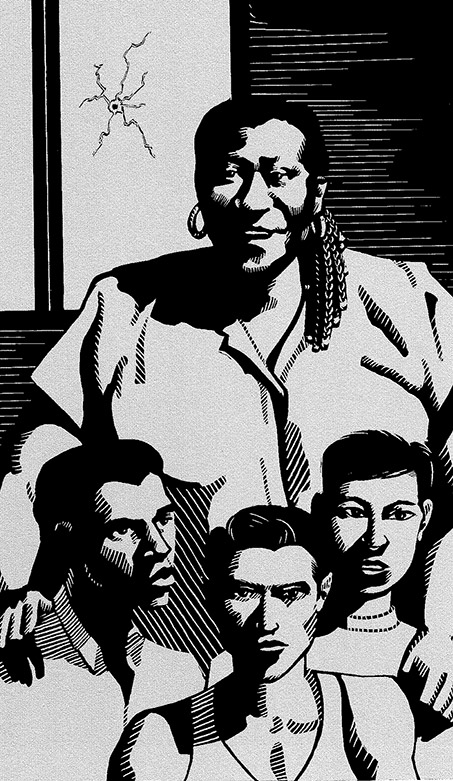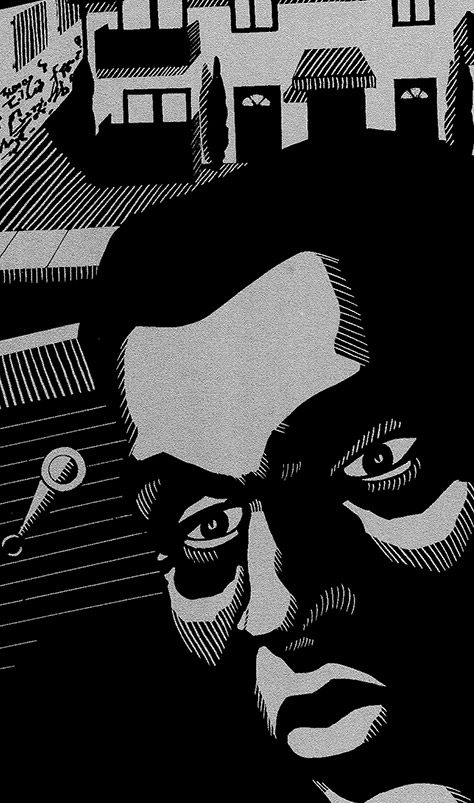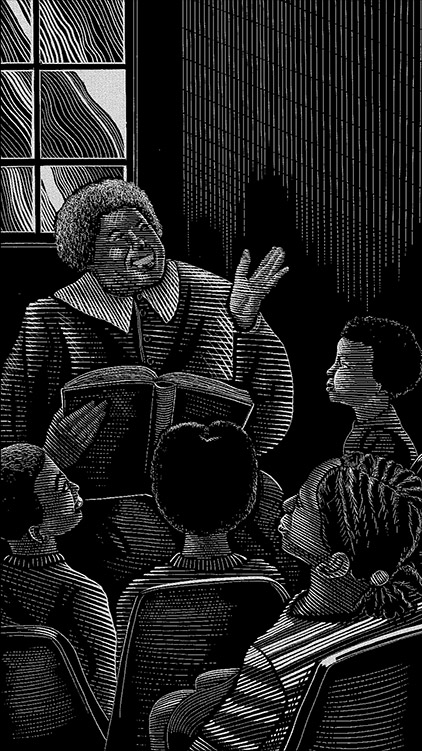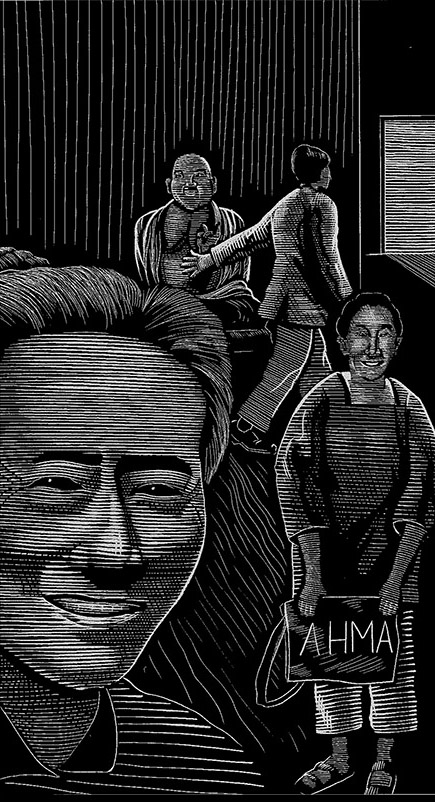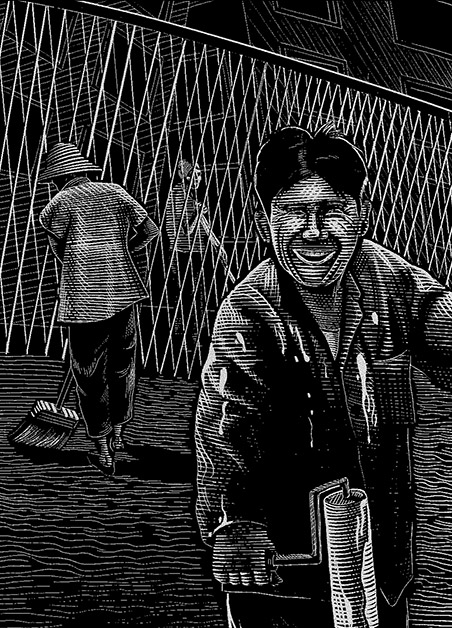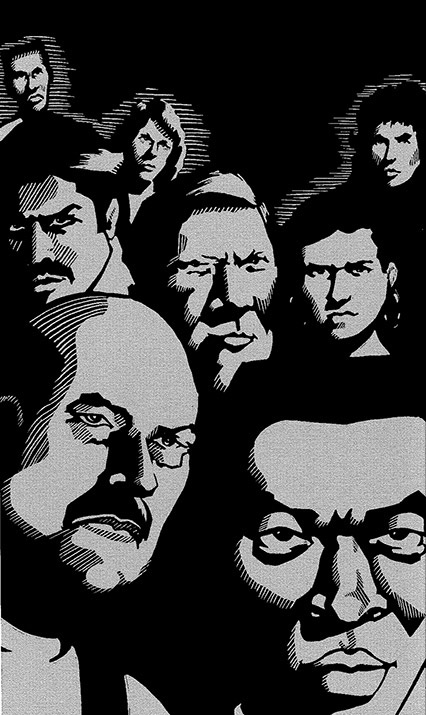These are Good People:
Moments Worth Remembering from two Decades of Property Management
Forward
You may find this section unusual. We hope so. Instead of listing our firm’s services, abilities and references along with some obligatory pictures of people sitting at computers or gathered in conference, we have chosen to lay before your eyes a series of moments.
Small moments.
Telling moments.
Moments recalled from more than forty fascinating, satisfying years in the publicly assisted property management business.
A writer and illustrator have reconstructed these moments from the recollections of people in our company. To the extent that memory and the writer’s hand have edited reality, these are small works of historical fiction.
But they are true.
And they tell you more about Barker Management, Inc., and how we deal with people and how we solve problems, than would a conventional brochure or website.
Alongside each dramatized vignette we have added what medieval scribes called a “gloss,” an explanatory text that gives facts and figures and puts the moment in context.
We hope you enjoy reading this information . We intend it to entertain as well as explain. It is not your usual corporate website; and Barker Management, Inc. is not your usual property manager.
If we make no other point, that is enough.
Peter Barker, President
Introduction
This is a company whose Chairman and majority stockholder will, during a visit to a property under management, without drawing attention to the act, pick up someone’s thoughtlessly discarded paper cup and walk a hundred feet out of his way to toss it into a dumpster.
This is a company whose President started as a maintenance employee and worked his way up in the business. The company he leads today manages more than 10,000 units of housing.
Barker Management, Inc., is nothing more or less than the sum of its people. And it is comprised of hardworking, resourceful, responsive, decent, loyal, compassionate people. People who are supportive without being condescending. People who can be tough without being mean. People who can be efficient without being cheap. Barker Management, Inc., is dedicated staff spending endless hours comparing insurance rates and insurer ratings to make sure developments have the best coverage at the least cost.
Barker Management, Inc., is hardworking accounting staff whose meticulous attention to detail has saved records auditor’s hundreds of hours completing their review.
Barker Management, Inc., is a thorough compliance department which understands what it takes to give essential high priority to our tax credit clients.
Barker Management, Inc., is loyal, courteous property staff, patiently working with a resident that hears sounds when no one is around, and persisting in finding help for the troubled woman without involving police.
Because of its people, Barker Management, Inc., has come to be regarded as one of the nation’s most effective managers of affordable housing. One of its developments, singled out by HUD officials as a model, a place whose residents feel safe and proud, is less than a block from developments so dangerous that police will not enter them, except in force. Another development, now recognized as one of the best in the South Central Los Angeles area, was considered the area’s worst, prior to being assigned to Barker Management, Inc.
Not every development managed by BMI has been an unqualified success. No one is perfect. No company has a perfect record.
But, Barker Management, Inc., is enviable. And, if you ask anyone who has ever worked with our company – any owner, sponsor, resident board member, government official, anyone – you will find an opinion similar to this.
“Barker Management gets more done, in less time, with fewer people than any other management company anywhere.”
“They are good people. The best!”
Residential
Turning the corner, he knew what to look for — the first eyesore on the right.
It had been a year since his last inspection and it would be worse. Much worse. In the way that someone dying of emphysema gets worse. There would be another layer of graffiti. A deeper carpet of broken needles, broken beer bottles, balloons, baggies and surgical tubing scraps. More busted windows and screens. More leaky plumbing and stopped-up sewer lines. More hard-packed dirt where lawn used to be. More scraggly skeletons that used to be bushes.
More filth. More crime. More misery.
Highland Manor was, hands down, the most pitiful excuse for housing in HUD’s entire San Diego region. One giant dumpster with doors and windows. The best way to clean it up would be with a bulldozer, he thought, as he realized he’d driven right past the housing development while looking for it.
Three right turns and he was cruising slowly up Highland Avenue again, more attentive this time.
He almost missed the place again. Somebody had dropped a clean bomb.
No graffiti. No filth. No cockroaches –caught-by-daylight scurry of drug dealers at the sight of his government car.
Instead, neatly mown grass and primly pruned bushes with flowers on them. Screens on the windows. Actual light bulbs in the sockets by the doorways. Plainly painted walls in place of a cacophony of graffiti.
A faint, slightly disbelieving, slightly relieved smile crawled onto his face.
“Well I’ll be……”
Highland Manor was only 12 units, but it was welcomed by Santa Ana officials in 1976. The city was desperately short of low income housing.
By 1987, the welcome had turned to regret and anger. Highland Manor had degenerated into a black hole of drugs, filth and misery. The city was threatening to condemn and bulldoze the place. HUD’s San Diego office considered it the worst development between Los Angeles and the Mexican border.
Barker Management was assigned the development by the owner, a non-profit organization with limited resources and a strong desire to be rid of the troublesome apartments. What BMI found was a physical and financial disaster.
The building was nearly uninhabitable. Windows that weren’t broken wouldn’t close. Doors wouldn’t lock. Plumbing leaked and sewer pipes backed up. Landscaping had been trampled to bare dirt. The apartments were infested with drug dealers and users. The sidewalks were littered with drug paraphernalia and trash.
There were no reserve funds and most of the rents were in arrears. There were several layers of mortgages that, in total, far exceeded the degraded value of the development.
BMI immediately began rehabilitation through fundamental, aggressive management. Rents were collected. Drug dealers and users were evicted. HUD was successfully petitioned to allow a rental rate increase essential to long term viability.
Because the owner had no money to finance repairs, BMI reached into its own pocket. Within weeks the changes were as noticeable as new paint. After eight months, the HUD inspector arriving for annual inspection drove past without recognizing Highland Manor, so dramatic was the change.
Ten months into managing the development, BMI purchased it. A limited partnership was created, with ownership divided among a number of long-term BMI employees. The company retained a small percentage of ownership and continued to manage the development. After 18 months of intensive effort, Highland Manor was running smoothly, with positive cash flow and a stable resident population.
Highland Manor is often cited as an example of what can be done with very little money and a lot of hard work.
THE POINT IS: Vast resources are not essential to dramatic changes. Unswerving commitment is.
Residential
“There is no money to pay you.”
Steel words. Knife sharp. Hammer heavy. Bell clear. Not the kind of words you expect from a woman who, in the four days since the new management company took over, had seemed so pleasant.
No one in the room was surprised. The last paychecks had bounced. And at least someone was finally telling them the truth. After months of promises and excuses, bitter truth was easier to swallow than buttery lies.
Each of them supposed what her next words would be. You’re fired. Your rents are going up. If you don’t pay your rent you’ll be evicted. There has been a theft. Everyone is suspect.
Anger welled-up behind 28 stony faces. Jaws set. Teeth clenched.
“We’d like to try to turn this development around. It was intended to be a decent place to live. It still can be, if we all pull together.
“I’m asking all of you to stay on the job. Keep working. Work harder. Help us clean up everything that is dirty. Help us get rid of the drug dealers and the gangs.
“We’re talking to the bank and HUD. We hope to be able to pay you within two weeks. But we can’t pay you now, and we can’t promise what will happen.
“I want you to know that our company will be working without pay also. And we won’t be paid until you are.
“So how about it.”
There was more talk.
Everyone stayed.
And after 10 days, there were paychecks.
Clean house. Fire everybody. That would have been the easy way to deal with the demoralized staff at the sprawling housing development in Las Vegas.
There were 28 people on the payroll at the 289 unit complex. Eighteen of them were maintenance workers. All had been turning in abundant overtime. Yet none of the 70 vacant units were ready to rent. Everything was filthy, from rental offices to laundry rooms. Everything was broken, from faucets to water mains to windows to smoke alarms. Waste line stoppages were chronic. Broken air conditioners were rarely repaired. Workers were surly for the most part; gloomy at best.
They had reasons.
The shabbily constructed buildings were a maintenance nightmare. Water mains had broken under three buildings and formed huge caverns. They were sinking. It would take $3 million to make all the necessary repairs. There were no supplies. And no credit. The development was $350,000 in debt and getting $50,000 deeper each month. There was an unexplained $70,000 shortage of funds.
Working at the development was dangerous. Drug dealing and gang fights were common. There had been shootings. There were more than 100 unpatched bullet holes scattered around the development.
The problem wasn’t bad people. The problem was badly managed people.
Instead of firing all or some of the staff, BMI asked them all to stay on the job; to keep working without pay until financing could be obtained and cash flow generated from rent collections and subsidy payments.
They all did.
Just four days of contact with BMI’s people had given them confidence that, if anything could be done, these people would do it. If anyone could be trusted, it was these people.
THE POINT IS: The scarcer that resources are, the more you need the most scarcest resource of all — leadership.
Residential
No one could recall who it belonged to or how it got there.
No one from the co-op.
None of the neighbors.
As far as anyone could recall, it had been there for years. Smack in the middle of the backyard of the old clapboard house, locked in by walls and overhead power lines.
Like as not, it belonged to a previous resident or a friend of one. There was no way to tell. The house belonged to the co-op and until the management company had been hired, the record keeping had been spotty at best.
But there it sat, 1500 pounds of rust, rubber and broken glass, with flowers and weeds growing awkwardly from every nook and cranny.
“Co-op people been tryin’ to get rid of that thing for three years,” hollered the old man from next door.
“I know,” said the man from the management company who had been standing there for some minutes taking one last ponder as to how the thing had got into the backyard, in one piece, over the six-foot walls and under the power lines.
“It’ll be there ’til hell freezes over,” said the old man.
“It’ll be gone tomorrow.”
“How?”
“Buncha guys with strong backs. Gonna pick it up and carry it to where the tow truck can haul it off. Had to file for title to it, then sign it over. Took almost four months of hassle with the DMV.
“Well, you have my thanks. I’ve been sick of looking at it since I can’t remember when. Broken down VW ain’t what I want to see from my back porch.”
“Me neither.”
Getting rid of an abandoned Volkswagen should be easy. Just tow it.
But what if the rusting bug is on private property. Closed in on three sides by block walls, on the fourth by a house, and overhead by power lines.
And what if the backyard confining the VW belongs to a co-op and all of the members have a say in what to do and how much to spend to get rid of the junker. And what if the co-op membership is scattered across a city and a quorum is a blue moon event. Then you have a problem that would test the resourcefulness of an engineer and the patience of a diplomat.
BMI inherited that and other problems when it assumed management of a Los Angeles, California co-op. The VW had vexed the co-op’s board for three years and they were near voting to rent a $500-an-hour crane to rid them of the $75-salvage-value headache.
BMI found a towing service willing to drag the car through a barely-wide-enough gate and tow it away–provided that title to the vehicle could be transferred to them. It took nearly three months to secure title. And it took twelve strong men to heft the 1500-pound car from its resting place to the gate.
But the job got done.
Dealing with a 67-unit co-op consisting of rehabilitated homes scattered across a seven block area requires a particular resourcefulness.
BMI has responded with, among other things, a videotaped orientation program for new members; a video recorded inspection of properties prior to occupancy, and custom management reports so exemplary that they have been adopted by other co-ops nationwide.
THE POINT IS: The true test of ability is the unexpected and the exceptional.
Residential
“They looked at me like I was crazy.”
They had sprayed obscenities on the wall, including a threat of death to her eight-month-old son. “J.J. will die.”
She was furious.
When she spotted the three boys in the parking lot, she rolled down the window of her car and said, “If you was smart, you would’ve used paper. Only stupid people write on walls. If you wanna write, use a pad and paper.”
Then she drove away.
That’s not what they expected. And it was the start of their respect for her.
Later, they admitted what they had done. A woman she had threatened to evict had put them up to it–the writing on the wall; the BB-gun shot that had broken her living room window; the wheels stolen, one-by-one, from her car.
They were just bad little boys, but they were on the verge of becoming bad young men. And in Compton, that leads to jail and death.
So she gave them things to do. Picking up trash. Running errands. Anything to keep them out of mischief. She had them clean the laundry room and convinced the vending company to leave quarters for them.
When they misbehaved, she took steps. The next time they shot carelessly, she took the BB-gun away.
When she caught them in the olive trees, pelting passers-by with olives, she made them sit in her office.
And she brought them treats when she went to the store.
That was when they were 10.
Now, they are men. Robbie has two kids and works at the race track. Kenneth has three and is a technician. Jerome is a truck driver and his parents still live at the apartments.
She doesn’t see them very often. But when she does, they call her “mom.”
Commercial
“Look at this building. Three years old. Corner of two busy streets. Good location.
“Just the right size. Five stories. Fifty-five thousand square feet. Not too big, not too small.
“Major tenant on the ground floor–a branch of the S&L that owns the building.
“A slam dunk success, right? Even in an overbuilt market, right?
“Wrong.”
He speaks with uninterruptable force, each phrase a stepping stone leading directly to his point. There’s an edge to his voice. Perturbed. Anguished. It’s clear that unnecessary failure offends him.
“Three years of leasing and it’s still half empty. tenants up in arms. Withholding rents. Refusing to pay increases. Balance sheet ninety grand in the red. Mortgage payments are behind and the lender is threatening foreclosure.
“It never should have happened. No need! None!
“They bring us on as managers. Takes about two seconds to figure out what’s wrong and how to fix it.
“The big problem? There is none! No malfeasance. No bad construction. Just inattentive, inconsistent management. A little let up here, a little carelessness there and, boom, big trouble.
“Why the unhappy tenants? Dirty windows! Air conditioning out of whack! Can’t find a space in the parking lot! Trash in doorways! And no one returns their calls when they complain!
“Little stuff.”
What do we do? Wash the windows. Monthly. Adjust the air conditioning controls. Set up routine maintenance on them. Tighten monthly parking passes. Restripe the parking lot. Mark reserved and visitors spots.
“Simple stuff! Like replacing the daytime security guard with an on-site manager. Have him police the trash from the doorways, every morning. Keep the street people out of the restrooms. Talk to the tenants! Talk to them!
“All of a sudden, tenants get happy. They pay their back rent and start paying the rent increases. They don’t mind ’cause they’re getting what they pay for.
“Bottom line? Positive cash position restored in less than 120 days.
“The owner could still lose this building. We may not be able to save it. And if we can’t, it’ll be a terrible, terrible waste.
“If we’d have just been brought in 60 days sooner. “It really gets to me. It…just…does.”
From upside down to a positive cash position in 120 days. That summarizes one of BMI’s forays into commercial office building management.
When the owner of the 55,000 square foot building in Inglewood, California asked BMI to assume management, there was a balance sheet deficit of $90,000. And matters were getting worse, fast.
The building was only 55 percent leased after three years. The vacancy factor was more than twice the market average.
Even worse, cash flow slowed to a trickle. Disgruntled tenants were either ignoring agreed upon rent increases or withholding rents entirely.
BMI moved swiftly to correct deficiencies in maintenance, security and management that had angered and frustrated tenants. Windows were washed. Malfunctioning air conditioning controls were repaired. Trash that had accumulated in doorways was removed. Parking passes were tightened and tenant reserved spaces were designated and enforced.
A daytime security guard was replaced with an on-site manager.
The manager was trained to provide better security, to adjust and repair environmental controls and to respond promptly to tenant complaints, requests and questions. Emphasis was put on prompt resolution of problems, and feedback to tenants to assure them that solutions were permanent.
The result? Back rents were promptly collected. Rent increases that had been deferred were enforced without tenant objection.
Tenants who had given notice decided instead to renew their leases. Tenants even began referring potential lessees.
Positive cash position was restored. All within 120 days.
THE POINT IS: A big problem usually consists of many small problems. The quicker you solve the little ones, the smaller you make the big one.
Commercial
He popped the lid of the can and poured the rose gray paint into the tray without looking. He had done it that often.
“Never seen ’em. They know when you’re lookin’. Minute you’re not — zip, pffftt, pffftt and they’re gone. Sneaky. Quick. Like coyotes.
“Sometimes I think they must be mutants. Kids with spray cans for fingers.
He wiggled his fingers in awkward demonstration.
“Maybe that’s why you can’t read half of what they write. Hard to be neat when each finger weighs a pint.
“Can’t ever stop ’em, not entirely. But you can get it down to a manageable once-in-a-while.
“Paint’s best. Tried all that other stuff. Works so so. Just gotta keep painting.”
He threaded the roller onto the pole and dipped it into the tray, still only glancing at his work.
“They paint; you paint it over. They paint again; you paint it over again. And again. And again.
“Gotta do it at first light. That way it didn’t do ’em any good. Nobody sees what they wrote.
“Eventually, they give it up, ‘cept for once in a while, just to test you.”
Long unhurried strokes easily erased the scurried scrawling of the night.
“All you gotta do is paint one more time than they do.
“If you don’t quit….
He stooped, lifted the tray and trickled the left over paint back in the can.
“….you don’t lose.”
There was no clamor of developers anxious to build on the site at 27th and Western in Los Angeles, despite the available redevelopment financing.
The zoning called for commercial retail and the site could yield about 13,000 square feet of rentable space. Surrounding neighborhoods ran the gamut from moderately low income to impoverished.
Nearby existing retail storefronts were of two varieties — vacant and covered with graffiti or open and covered with iron bars and graffiti.
BMI stepped in where others were too timorous to tread. With a wealth of experience managing HUD housing developments in such neighborhoods, BMI knew what to expect and what to do.
A sturdy, attractive building was designed, with ample parking, simple, durable landscaping, clear sightlines from the street, generous lighting and security.
Instead of taking any tenant who offered, BMI held out for those who would provide essential services, were not put off by the tenuous environment and were willing to sign a long-term lease. A minimarket. A state office. A mom and pop restaurant. A laundromat.
From the beginning, BMI provided high profile management, visiting the center often and at all hours. Any damage to landscaping was repaired immediately. Litter was picked up and graffiti was painted over, daily when necessary.
The patience and persistence have paid off. The center, opened in May, 1987, took longer than normal to lease-up but has had no turnover in tenants at this writing. Tenant businesses have prospered and the development has produced a steady income stream. And the graffiti raiders have all but given up.
THE POINT IS: Even the most formidable obstacle will give way to the doggedly persistent.
Afterword
Forty plus years ago, when we first established Barker Management, Inc., we intended to create a company that challenged and nurtured its employees. We hoped to create a working environment that would foster independent action, innovation and upward mobility.
If we could be a company in which people grow, the reasoning went, we would be a growing company.
Our people have grown.
So has our company.
Today some of the people who started with us as cleaning or maintenance workers, supervise the management of hundreds of housing units or fill other key positions.
Time and again, our people have developed systems, procedures and reports that are considered exemplary.
We have done well for our employers, the owners and sponsors of developments entrusted to us. And we have done well by the thousands of residents and co-op shareholders upon whose lives we have so much effect.
What we hope for the future is the opportunity to continue what, we feel, has been well begun.

